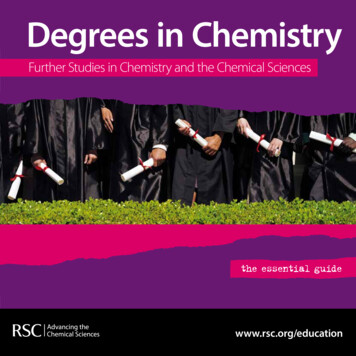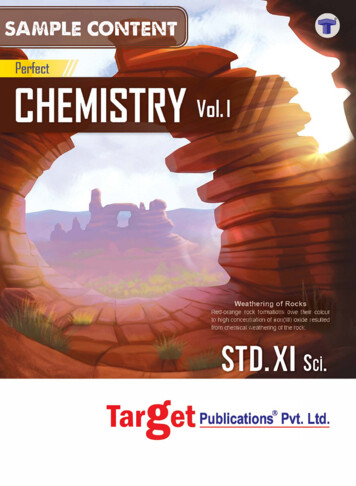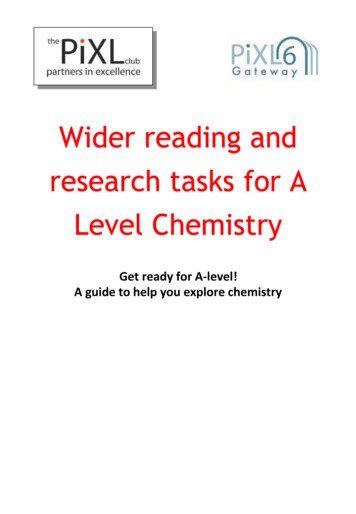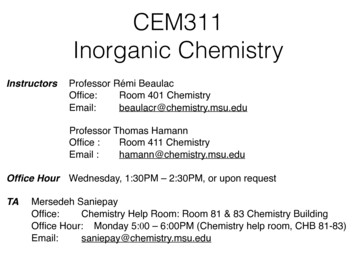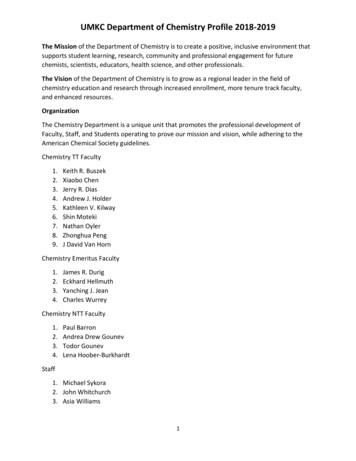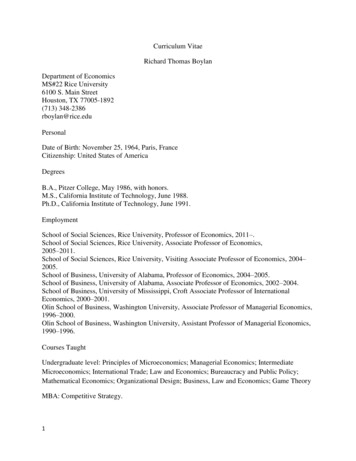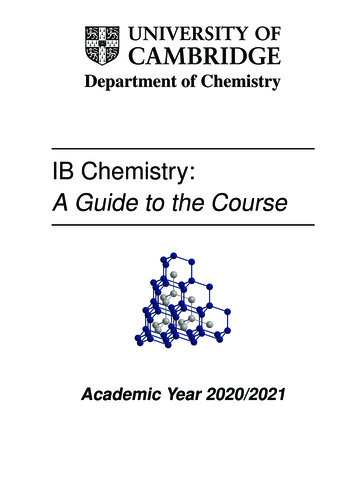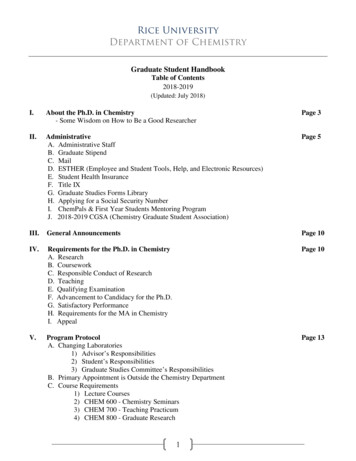
Transcription
Rice UniversityDepartment of ChemistryGraduate Student HandbookTable of Contents2018-2019(Updated: July 2018)I.About the Ph.D. in Chemistry- Some Wisdom on How to Be a Good ResearcherPage 3II.AdministrativeA. Administrative StaffB. Graduate StipendC. MailD. ESTHER (Employee and Student Tools, Help, and Electronic Resources)E. Student Health InsuranceF. Title IXG. Graduate Studies Forms LibraryH. Applying for a Social Security NumberI. ChemPals & First Year Students Mentoring ProgramJ. 2018-2019 CGSA (Chemistry Graduate Student Association)Page 5III.General AnnouncementsPage 10IV.Requirements for the Ph.D. in ChemistryA. ResearchB. CourseworkC. Responsible Conduct of ResearchD. TeachingE. Qualifying ExaminationF. Advancement to Candidacy for the Ph.D.G. Satisfactory PerformanceH. Requirements for the MA in ChemistryI. AppealPage 10V.Program ProtocolA. Changing Laboratories1) Advisor’s Responsibilities2) Student’s Responsibilities3) Graduate Studies Committee’s ResponsibilitiesB. Primary Appointment is Outside the Chemistry DepartmentC. Course Requirements1) Lecture Courses2) CHEM 600 - Chemistry Seminars3) CHEM 700 - Teaching Practicum4) CHEM 800 - Graduate ResearchPage 131
Rice UniversityDepartment of ChemistryD.E.F.G.H.I.J.Course WaiversAnnual EvaluationTime AwayProbation and DismissalConflict ResolutionReduction or Termination of Financial SupportGraduate and Postdoctoral Studies Guidelines for Academic Probation,Dismissal, Petitions, and GrievancesK. Achievement AwardsVI.Typical Timeline for a Ph.D. StudentPage 24VII. First Year of Graduate ProgramA. Early MatriculateB. Orientation (O-week) and Registering for CoursesC. UNIV 594 - Responsible Conduct of Research RequirementD. Adding Courses / Dropping CoursesE. Joining a LabPage 25VIII. Second Year of Graduate ProgramA. Advancement to CandidacyB. Qualifying ExamPage 29IX.Advancement to Candidacy to GraduationA. Ongoing RequirementsB. Annual EvaluationsC. Thesis DefensePage 30X.Appendix I – Qualifying Exam GuidelinesPage 31XI.Appendix II – Example of Online Student EvaluationPage 37XII. Resources for Rice Graduate StudentsPage 402
Rice UniversityDepartment of ChemistryI. ABOUT THE Ph.D. IN CHEMISTRYWelcome to the Rice University Department of Chemistry! The department encompasses those at Rice whoinvestigate the composition, properties, structure, reactivity and mechanisms of transformations of matter.Among us are theorists and experimentalists, organic chemists and inorganic chemists, physical chemistsand biological chemists, scientists and engineers. Rice is a terrific place to do research in Chemistry. Thedepartment has developed two Nobel laureates and many members of the National Academy of Sciences.For decades, Rice culture has promoted interdisciplinary research. Most Rice Chemistry professors haveadditional appointments elsewhere, including four of the five science departments and four of the eightengineering departments on campus. We have particularly strong programs in nanoscale science, theoreticalChemistry, inorganic materials, experimental physical Chemistry, biological Chemistry, supramolecularChemistry, biophysics and environmental Chemistry. Rice University is a member of the Texas MedicalCenter, which is the largest in the world, and the Department of Chemistry is at the center of importantbreakthroughs in nanomedicine.Our graduate program is sharply focused on promoting the highest level of achievement for each Ricedoctoral student. The program is highly selective, admitting only about 25 graduate students a year. Thesesmall numbers ensure that Rice graduate students have exceptional access to faculty time, instrumentationand other resources. As a consequence, Chemistry graduate students at Rice develop unusually strongpublication records. To ensure that financial constraints are not an obstacle, we waive the application feefor domestic students who have a GPA of 3.7-or-above, and provide a generous stipend and full-tuitionwaiver for those students who enter our doctoral program.3
Rice UniversityDepartment of ChemistrySome Wisdom on How to Be a Good Researcher You are a junior research colleague, not a lab assistant or technical support. You are learning howto conduct research, not just how to perform experiments or calculations. Aim to become a creative, independent researcher, and strive to perform novel, creative research inthe process. Think critically: always question yourself, your advisor, your colleagues, and the literature. Read the literature: first, capture the essence of articles, not the details; then, go back to the mostrelevant articles and look for details where appropriate. The amount of the scientific literature on allsubjects in Chemistry is huge, and you have to be able to separate the important things from the lessrelevant. Set long-term research goals: what do you want to achieve? Why is it important? What will you andothers learn from your research? Set short-term objectives accordingly. Mountains are climbed one step at the time. How can youbreak the long-term goals into shorter-term objectives? How can you achieve the first fewobjectives? If you can’t see a clear path, can you break down your objectives further? Don’t take shortcuts. Often, there is a right way and an easy way to solve a problem: they rarelycoincide. Choose the right way over the easy way. Build each step of your research on soundfoundations. Think creatively and not only when you’re in the lab. Think about your problem while you shower,while you cook, while you drive, before falling asleep. If you’re too tired to think creatively, take abreak with your friends or family - then get back at your problem! Work hard and persistently: a good Ph.D. dissertation requires four to five or even more years ofdedicated hard work. You, your advisor, and your colleagues are going into uncharted territory; thus, none of you canknow where the dead ends are. Making mistakes and meeting dead ends is normal. Overcomefrustration, learn from mistakes, and improve! Keep trying new things every time! Once you’ve thought hard about a problem, challenge your thinking with your colleagues, advisor,and other professors. Explain to them what you’re trying to do and how, in both formal and informalsettings. Don’t be afraid to look stupid: the only people who have no stupid ideas are those whohave no ideas! Listen critically to your colleagues’ replies for any useful advice. Can they point youtowards useful work in other areas you have overlooked? Do they know of methods, materials,theories, etc., that you can bring to support your problem? Set high standards for yourself first and then for your collaborators. Do not be narrow-minded! Do not concentrate only on your specific area of research. Try to learnas many different scientific topics as possible. Frequently, new things are discovered on the borderbetween different fields and subjects.4
Rice UniversityDepartment of ChemistryII. ADMINISTRATIVEA. Administrative StaffChemistry graduate students are welcome to ask any of our staff for assistance at any ky ArmstrongExecutive Administratorx2895HBH 05vstrongCarlos CabelloChemistry Store Managerx3255SS 113ccabelloJavier ChavezStorekeeper IIx3257SS 101jjchavezSusan CudnikStorekeeper Ix3275SS 113scudnikRuxin FengTeaching Stockroom ManagerAcademic ProgramAdministratorx3488DBH 278ruxin.fengx2906SS 111X2653DBH 341nancyneilcknowlton(cell 832629-6371)SS 111ponNancy NeilCorina KnowltonProgram AdministratorPam OnGraduate ProgramAdministratorPedro R. PradoLead Financial Administratorx3868SS 111prpradoBella RodriguezDepartment SS 111bar4x5402SS 111akv1PatriciaVillanuevaSeminar & Event Coordinatorx4082SS 111pv9Anita WalkerUndergraduate & ClassroomCoordinatorx4027DBH 243aawalkerAbby Vacekx5820B. Graduate StipendIndividuals paid on a semimonthly schedule receive a consistent amount of pay twice each month. Graduatestudent payroll (GR) direct deposits are issued on the 15th day of the month and the last day of the month,or the previous business day if the pay date falls on a holiday or weekend. Each pay week in the semimonthlypay period runs from 12:01 a.m. Sunday until 12:00 midnight the following Saturday. If you have anyquestions regarding your stipend, please contact the Graduate Program Administrator, Pam On(pon@rice.edu).5
Rice UniversityDepartment of ChemistryC. Mail & PackagesGraduate Student mailboxes can be found in SS 111 and BRC near the freight elevator on the 1st floor.Please see Pam On (pon@rice.edu) if you do not have a mailbox. Students who are assigned to labs in theBRC can contact Camy Noelck for mail-related questions: 713-348-8415/camy@rice.edu. FedEx and UPSPackages are received at the Space Science receiving dock, SS 101.D. ESTHER (Employee and Student Tools, Help, and Electronic Resources)ESTHER is the Rice University web application for students, faculty, and staff. Students will use thisapplication to register for classes, retrieve data such as grades, and access account information.For information about how to use ESTHER,http://registrar.rice.edu/students/ESTHER FAQs/.pleasevisitthefollowingsite:Resources in ESTHER: Update your contact information Register Add and drop courses View your course schedule Access your final grades View your unofficial transcript Obtain enrollment verifications Print your degree application View course & instructor evaluation comments for previous semesters Identify holds on your account View financial aid information View your employment information, such as your past pay stubs (if applicable) Review charges and payments Pay your account online Changes to forms (W4 & direct deposit information)E. Student Health InsuranceStudent Health Insurance: Rice University requires all degree-seeking students to have health insurance.Students electing to enroll in the Rice Student Health Plan may opt to be billed annually or semi-annually.Contact the Cashier’s Office for payment options (713-348-4946). You must complete an insurance waiverform to waive your enrollment in the Rice Student Health Plan.Health Data Form (HDF): ALL new undergraduate students and graduate students are required to submita properly completed Health Data Form (HDF) to Rice University Student Health. All students under theage of 30 years, regardless of classification, must provide formal documentation of vaccination againstmeningococcal disease. (https://health.rice.edu/)F. Title IXRice encourages any student who has experienced an incident of sexual, relationship, or other interpersonalviolence, harassment or gender discrimination to seek support. There are many options available both on6
Rice UniversityDepartment of Chemistryand off campus for all graduate students, regardless of whether the perpetrator was a fellow student, a staffor faculty member, or someone not affiliated with the university.Students should be aware when seeking support on campus that most employees are required by Title IXto disclose all incidents of non-consensual interpersonal behaviors to Title IX professionals on campus whocan act to support that student and meet their needs. The therapists at the Rice Counseling Center and thedoctors at Student Health Services are confidential, meaning that Rice will not be informed about theincident if a student discloses to one of these Rice staff members. Rice prioritizes student privacy and safety,and only shares disclosed information on a need-to-know basis.If you are in need of assistance or simply would like to talk to someone, please call Rice Wellbeing andCounseling Center, which includes Title IX Support at 3311 / (713) 348-3311.Policies, including the Sexual Misconduct Policy and Student Code of Conduct, and more informationregarding Title IX can be found at safe.rice.edu.G. Graduate Studies Forms LibraryThe Office of Graduate & Postdoctoral Studies (GPS) keeps a very useful library of commonly neededforms for everything from leave of absence to candidacy petition to thesis submission. They can be foundat http://graduate.rice.edu/forms/.Specific forms include:Enrollment Leave of Absence Short Term Medical Release and Parental Leave Withdrawal (a statement of withdrawal is also required)Registration and Transfer Credits Registration forms can be found at the Office of the Registrar's websitehttps://registrar.rice.edu/ Transfer Credit forms are available through the Office of the RegistrarCandidacy Candidacy Petition Instructions Master’s Candidacy Petition Doctoral Candidacy Petition Request for Extension of Time to CandidacyThesis Defense Thesis Defense Instructions Electronic form for announcing your defense as required by the General Announcements Request for Extension of Time to Defense7
Rice UniversityDepartment of ChemistryThesis Submission Thesis Submission Instructions Master’s UMI Agreement Form Doctoral UMI Agreement FormDegree Conferral Registrar's Application for Degree (all degree candidates) Petition for a Non-thesis Master’s Petition for an Automatic (or Candidacy) Master’s Graduation ChecklistsCommencement Check the graduate.rice.edu/graduation website (Degree Conferral and Graduation) forinformation regarding commencement weekend in mid-March prior to yourcommencement.H. Applying for a Social Security NumberGenerally, international students are eligible to apply for a social security number (SSN) or an IndividualTax Payer Identification Number (ITIN) after 10 days in the US.For more information, please visit https://www.ssa.gov/ssnumber/ or the employment section on OISSwebsite http://oiss.rice.edu/forms/It is advised to obtain a Social Security Number as soon as possible in order to decrease tax withholdingsfrom graduate stipends.To be eligible, the student must meet all the following requirements: Student is on F-1 visa status. Student is currently enrolled full-time. Student has secured employment, i.e. on-campus job, off-campus CPT/OPT, research assistant orteaching assistant in academic department (fellowships are not considered employment). Student has been in the United States for more than 10 days. Student has been registered as a full-time student in SEVIS.If all requirements have been met, please follow these procedures: Request the Graduate Program Administrator, Pam On (pon@rice.edu) to complete the “EmployerVerification Form”, available in the Office of International Students & Scholars or on-line athttp://oiss.rice.edu/forms/. Take the completed form to OISS to complete the SSA Letter of Support. Once you receive your Social Security Number, go to Payroll to submit your information.8
Rice UniversityDepartment of ChemistryI. ChemPals & First Year Students Mentoring ProgramThe Chemistry Department, with the assistance of CGSA, invites each new student to be a part of theincoming student mentoring program, ChemPals.CGSA (Chemistry Graduate Student Association) is a group dedicated to the service of Rice Chemistrygraduate students. They act as a liaison between graduate students and the Department as well as planspeakers, monthly happy hours, and outings! Through CGSA, the ChemPals program was developed andimplemented. ChemPals are current graduate students in our Chemistry Department who serve as your “goto” - particularly during your 1st year as you transition into Grad/Rice life. Each incoming student receivesa ChemPal.You can contact the CGSA President, Nicholas Moringo (nicholas.moringo@rice.edu) or Pam On(pon@rice.edu) for additional information.J. 2018 - 2019 CGSA (Chemistry Graduate Student Association)PositionNameRice Mail AddressPresidentNicholas Moringonicholas.moringo@rice.eduVice PresidentDavid Renarddr23@rice.eduSecretarySarah Hahnsarah.a.hahn@rice.eduTreasurerLuke Hendersonlah7@rice.eduInventoryLauren Warninglauren.a.warning@rice.eduGSA RepresentativeAcademic SpeakerCoordinatorCareer Speaker CoordinatorKaitlin Knappkknapp@rice.eduLauren McCarthylam14@rice.eduDouglas Walkerdouglas.r.walker@rice.eduSocial ChairVanessa Espinozavbe1@rice.eduCGSA Webpage: http://python.rice.edu/ cgsa/index.html9
Rice UniversityDepartment of ChemistryIII. GENERAL ANNOUNCEMENTSRice University publishes its "General Announcements" each year. These are the official rules of theuniversity and can be found at http://ga.rice.edu/. The section titled "Graduate Students" outlines the basicrules and expectation for all graduate students at Rice University. Students must be in agreement with theGeneral Announcements and Code of Conduct found at: https://sjp.rice.edu/code-of-student-conductWhile all students are bound by these minimum requirements, many programs including the Ph.D. inChemistry have additional requirements. The second portion of the General Announcements is the sectionspecific to the Department of Chemistry, which can be found at https://chemistry.rice.edu. Thissection details all of the basic requirements for earning a Ph.D. in Chemistry. This section from themost recent general announcements is reproduced below:In case there is conflicting information, university-wide regulations take precedenceover department-wide regulations, which take precedence over research group-wideregulations.When in doubt, students should seek help first at the department level (Graduate ProgramAdministrator, Chair of Graduate Studies, Advisor, and/or Department Chair) and then at the CentralAdministration level (Office of Graduate and Postdoctoral Studies). It is very important and useful tofollow this order and not to contact all sources at the same time.Requirements for MA and Ph.D. in ChemistryFor general requirements, see Graduate Degrees ortunities/degrees/). Students who have completed coursework equivalent to that required fora BA or BS in Chemistry may apply for admission to the Ph.D. program. For more information,see Admission to Graduate Study icies-procedures/admission/). Students are not normally admitted to study for an MA degree.IV. REQUIREMENTS FOR THE Ph.D. IN CHEMISTRYA. ResearchThe Ph.D. in Chemistry is awarded for original research in chemistry. During the first semester of residence,students select a research advisor from among the members of the faculty. In some cases, students maychoose research advisors outside of the department. Approval of the department chair is required toformalize these advising relationships. The research advisor will guide the student in the choice of anappropriate research topic and in the detailed training required to complete that project. Students mustsuccessfully complete CHEM 800 Graduate Research and CHEM 600 Chemistry Seminars every semesterof residence. Candidates earn a Ph.D. after successfully completing at least 90 semester hours of advancedstudy in Chemistry and related fields, culminating in a thesis that describes an original and significantinvestigation in Chemistry. The thesis must be satisfactorily defended in a public oral examination. Thestudent must pass the thesis defense before the end of the 16th semester of residency.10
Rice UniversityDepartment of ChemistryB. CourseworkWithin the first two years, the student must complete six 3 credit lecture courses at Rice University, or theirapproved equivalent. In order to satisfy this requirement, each of these courses must satisfy all followingcriteria: They must be approved by the department’s Graduate Studies Committee. Chemistry graduate courses must be at the 500 level or higher. Certain 300- and 400-level coursesin other departments may be acceptable with prior approval by the department’s Graduate StudiesCommittee. A maximum of three lower-level courses in other departments can count towards thesix-class requirement, and these do not count towards the University-wide requirement of 90 creditsat the 500 level. Courses must be in technical subjects in science or engineering. Courses inteaching, presentation, or management will not be counted toward the six-class requirement. Each course must be passed with a grade of B- or higher. It is possible to repeat or replace amaximum of 2 courses, upon approval of the department’s Graduate Studies Committee. Students who pursue both the BS and the Ph.D. at Rice need not duplicate course work for the twodegrees. However, teaching as an undergraduate does not substitute for the teaching requirementsin the Ph.D. program.C. Responsible Conduct of ResearchEach graduate student must successfully complete the ethics course UNIV 594.D. TeachingEach graduate student must participate in teaching (CHEM 700) for the equivalent of three (3) semesters.An average of a B- in all 3 courses is required. Assignments are determined by departmental needs.E. Qualifying ExaminationThe qualifying exam has written and oral components (the expectations are available in the departmentoffice). The committee will be composed of three faculty members, excluding the research advisor. Thewritten document must be submitted to the committee at least one (1) week before the date of the oralexamination. The examination must be taken by the last day of class at the end of the student’s 4th semesterin residency. Any follow-up work required by the committee must be completed by the assigned date, andthe exam must be passed by the end of the 6th semester. For detailed information, see “X - Appendix I Qualifying Examination Guidelines”.F. Advancement to Candidacy for the Ph.D.After completing the required coursework, teaching, and qualifying examination each student must petitionto Advance to Candidacy for the Ph.D. degree. Upon advancement, a student chooses a thesis committeeof at least 3 faculty members with the guidance and approval of the research advisor and department chair.The thesis committee must include one faculty member whose primary appointment is outside of theDepartment of Chemistry. Detailed information regarding choosing a thesis committee can be found in oral-degrees/11
Rice UniversityDepartment of ChemistryG. Satisfactory PerformanceTo remain in good standing, a student must: Be enrolled full time in a departmentally approved research group beginning the secondsemester, and every semester thereafter. Upper Level Lecture Courses (additional information can be found on page 15) Maintain an overall GPA of 3.0 (B) or higher in upper level lecture courses CHEM 600 - Chemistry Seminars (additional information can be found on page 15) Receive a semester grade of 3.0 (B) or higher A grade of 2.67 (B-) or below will place you on probation CHEM 700 - Teaching Practicum (additional information can be found on page 19) Receive a semester grade of 3.0 (B) or higher A grade of 2.67 (B-) or below will place you on probation CHEM 800 - Graduate Research (additional information can be found on page 19)Failure to maintain satisfactory grades and sufficient progress in research will resultin probation and possible dismissal. Receive a semester grade of 3.0 (B) or higher A grade of 2.67 (B-) or below will place you on probationAll graduate students are evaluated annually to ensure that they are making appropriate progress towardsthe degree (see “Section XI - Example of Online Student Evaluation). The student, advisor, or departmentmay request a meeting between the student and a faculty committee at any time to evaluate progress or todetermine a course of action. If progress is unsatisfactory, the committee may recommend a semester ofprobation, which could result in dismissal from the program if progress remains unsatisfactory in theprobationary semester and any following. A second probation at any time will lead to dismissal.H. Requirements for the MA in ChemistryAlthough students are not normally admitted to study for an MA, graduate students may earn the MAafter obtaining approval of their candidacy for the Ph.D. The MA may also be earned by students who donot achieve Ph.D. candidacy by satisfying all following requirements: Completing the six one-semester courses required for Ph.D. candidacy Producing a Master’s thesis that presents the results of a program of research approved by thedepartment Passing a final Master’s thesis defense and submitting the thesis to the Office of Graduate andPostdoctoral StudiesI. AppealStudents may petition the Chemistry Graduate Studies Committee for variances on these academicregulations. Contact your Graduate Program Administrator (Pam On) to obtain more information onAcademic Petitions.12
Rice UniversityDepartment of ChemistryV. PROGRAM PROTOCOLA. Changing LaboratoriesAfter a student has joined a research group, either the student or the advisor might determine that this matchis not suitable. Keep in mind that changing laboratories is likely to set the student’s timeline back severalmonths. Before taking any actions, students should first discuss the situation with the current PI and exploreall possible solutions (e.g., changing the project, receiving more supervision). If the student decides tochange labs, approval of the Graduate Studies Committee and Department Chair is required.A student is required to find a new research advisor to continue in the program if: She/he has been asked to leave the lab by her/his advisor.A student may elect to leave her/his research group based on research area, perceived mismatch instudent/advisor personality, or other irreconcilable differences.Regardless of the reasons the original student/advisor relationship has ended, the case is referred to theGraduate Studies Committee as soon as possible.1) Advisor’s Responsibilities:If an advisor determines that a student’s research performance is not adequate for timely progress towarda Ph.D., the advisor must explain in writing the reasons and establish expectations and a timeline so thatthe student can fully address the issues. A minimum timeline of 1-2 months (half a semester) isrecommended by the Graduate Studies Committee. The written evaluation must be shared with thestudent and the Directors of Graduate Studies. If the student fails to meet the expectations set by thedeadline, the advisor can ask the student to leave the group after documenting in writing how the studenthas continued to fail. Two written statements are therefore requested before an advisor can ask a studentto leave her/his group.In addition, for letter grades of B (not a failing grade) and below (B- and lower triggering an automaticprobation) in CHEM 800, a written evaluation by the advisor is required. The evaluation needs todocument the reasons for the grade, how performance issues can be addressed moving forward, and atimeline for the expectations expressed, assuming that the student is not asked to leave the groupimmediately (i.e. it is the first written evaluation documenting lack of performance). This evaluationneeds to be sent to the student as well as the Directors of Graduate Studies. Note that this requirement isin addition to the yearly evaluations and it is triggered based on CHEM 800 research grades eachsemester.2) Student’s Responsibilities:A student who is considering changing advisors should consult with the Directors of Graduate Studiesor the Department Chair. To avoid potential conflicts that may result in a change of labs, students areencouraged to communicate often with their advisors and, in case of any issues, ask for written feedbackand a suggested path forward including deadlines.It is, furthermore, the right of every student to ask for her/his thesis committee to meet anytime and to13
Rice UniversityDepartment of Chemistryprovide feedback in order to resolve potential conflicts. If the thesis committee has not been established,the Graduate Studies Committee will assign an appropriate committee.After changing the lab, it is the student’s responsibility to call a meeting of her/his thesis committee toevaluate the success of the transfer and if the student is making reasonable progress in a new group. Thismust be done at the end of the first semester after transferring to a new group.3) Graduate Studies Committee's Responsibilities:a) Determine whether it is appropriate for a student to try to find a new lab and stay in the program,or if the student should depart from the program.b) If the student is approved to look for another lab, the committee must decide how long thestudent has to find a new advisor and recommend whether it would be appropriate to provide anybridge resources to support the student while she/he is not affiliated with a lab. The departmentchair will formally be the student’s advisor during any time the student is between labs, and willsubmit grades and other evaluations of the student.c) If the student finds an advisor willing to support her/him, the committee will determine if theparticular student/advisor match has sufficient promise to go forward. The committee may solicitletters from: the student, the previous advisor, and any potential new advisor(s). The committeemay also ask the student to make a presentation on items such as: research achievements with theprevious advisor, likely research projects with the proposed advisor, reasons for moving, oranything else relevant to the case in question. If the committee does not gain adequate confidencethat changing advisors will lead to a positive outcome, the student will not be allowed to continuein the program. Generally speaking, the fewer years that the student has been with her/his originaladvisor the more favorable the outlook of the committee will be. Transfers during a student’s 1styear are relatively common and usually due to student/advisor mismatch. Transfers afteradvancement to candidacy suggest a major setback in timeline to graduation and significantproblems with the student in question.d) If a student changes advisors
Rice University requires all degreeeeking students to have health insurance.-s Students electing to enroll in the Rice Student Health Plan may opt to be billed annually or semi-annually. Contact the Cashier's Office for payment o ptions (713- 348-4946). You must complete an insurance waiver form to waive your enrollment in the Rice Student .

